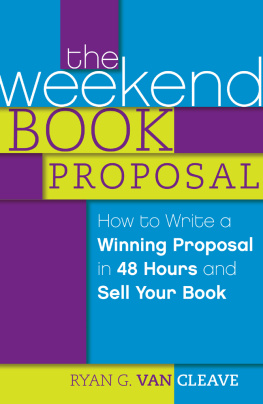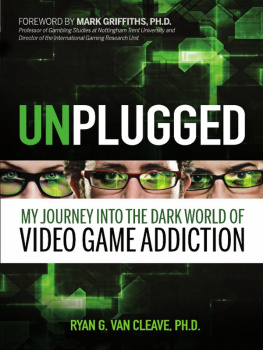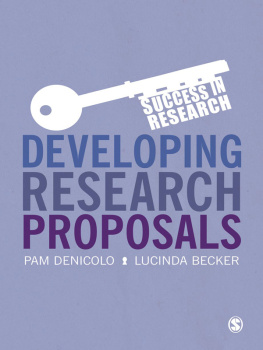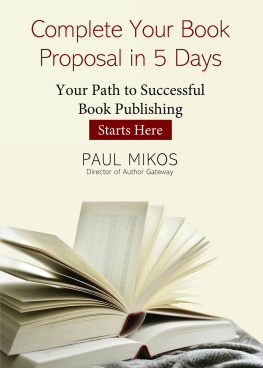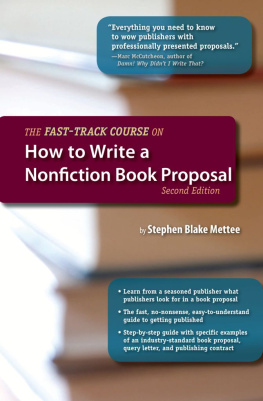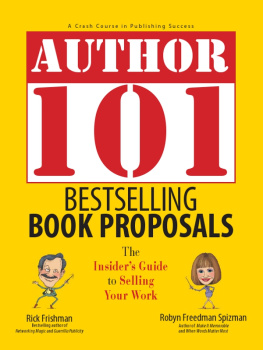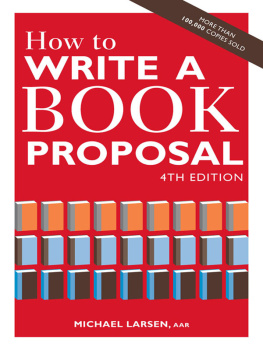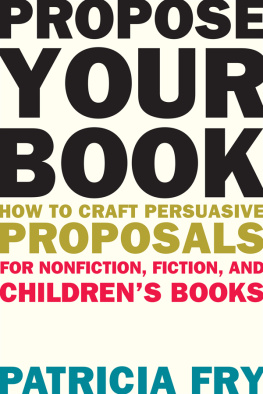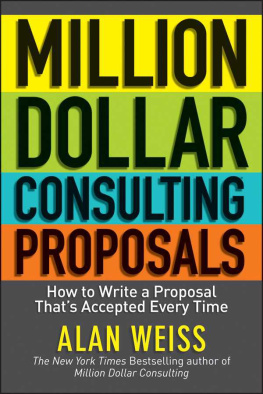For all the students in my workshops and classes whose dreams of publishing their own books led me to write this one.
CONTENTS
Part One:
THE PROPOSAL
Chapter One:
BOOK PROPOSALS: Some Basics and Background
Chapter Two:
CONSIDER THE AUDIENCE: Creating Elevator Pitches, Timely Topics, and Well-Structured Books
Chapter Three:
SNAPPY TITLES: How to Create Interest from the Start
Chapter Four:
MARKET ANALYSIS: Which Readersand How Many of ThemNeed This Book?
Chapter Five:
TAKING ON THE COMPETITION: What Makes This Book Special?
Chapter Six:
PUBLICITY CAMPAIGNS: What Can I Do to Help Sell Copies?
Chapter Seven:
AUTHOR BACKGROUND: Who Am I to Write This Book?
Chapter Eight:
MANUSCRIPT SAMPLES: The Lowdown on Size, Strategy, and Sizzle
Chapter Nine:
ENDORSEMENTS: Which Big-Name People Will Endorse Your Book?
Chapter Ten:
THE PITCH: Getting a Foot in the Door with a Dynamite Query Letter
Chapter Eleven:
NUTS AND BOLTS: Front and Back Matter, Formatting, and More
Part Two:
SAMPLE PROPOSALS
Chapter Twelve:
THE NONFICTION BOOK PROPOSAL: Two Annotated Examples
Chapter Thirteen:
THE NOVEL PROPOSAL: Two Annotated Examples
Chapter Fourteen:
THE ANTHOLOGY PROPOSAL: Two Annotated Examples
Chapter Fifteen:
THE MEMOIR PROPOSAL: An Annotated Example
Chapter Sixteen:
THE TEXTBOOK PROPOSAL: An Annotated Example
Part Three:
INSIDER ADVICE
Chapter Seventeen:
INTERVIEWS WITH TWO EDITORS
Chapter Eighteen:
INTERVIEWS WITH TWO LITERARY AGENTS
Chapter Nineteen:
TEN INSIDER TIPS THAT MIGHT MEAN THE DIFFERENCE BETWEEN SUCCESS AND DISASTER
INTRODUCTION
Like so many writers, my morning consists of sipping coffee, watching ESPN, scouring freelance writing job sites, creating new query letters, editing manuscripts, and firing off a dozen work-related e-mails. Later, Ill send out a slew of non-work-related e-mails, read the headlines off Yahoos home page, stare into the backyard, and wonder if the neighbors dog did its business there again.
I might knock out a page or two of my supernatural thriller or my presidential humor book while choking down a charred Lenders cinnamon raisin bagel that no coffee dunking can save. And thats all before 9:30 in the morning!
In short, Im a busy guy. My life is one giant multitasking challenge. I have a wife. I have two daughters. I run private writing workshops. I teach at the Ringling College of Art + Design. I ghostwrite. I play pickup basketball (alright, I used to). I watch American Idol. Im an NFL junkie. I jog (occasionally). And from time to time, I take my wife out for a nice dinner.
Simply put, I can no longer take my former dissertation directors advice:
Time + Reflection + Patience = Writing Success.
Oh, and on his office wall was taped this Oscar Wilde quote: I was working on the proof of one of my poems all the morning, and took out a comma. In the afternoon, I put it back again.
When I was a grad student, I could afford to take three days to consider the use of an epigraph in a short story. Now? I have to knock out rent and pay the orthodontist. Writing articles, fillers, short profiles, and book reviews are great for coming up with lunch money, but its writing books that really pays the bills. Its writing books that lets you quit your high school janitor or prison guard job. And unless youre Stephen King, Stieg Larsson, or some other fiction berstud (and most of us are not), that means writing nonfiction books, which make up 85 percent of the new titles published every year.
Pretty good odds, right? But heres sobering news99 percent of nonfiction book proposals are rejected (which explains Bowkers recent announcement that 211,269 titles were self-published in 2011), thanks to:
- higher publishing costs than ever before
- already-written books covering your topic
- editors and agents too overworked and underpaid to notice your brilliant literary potential
- a flailing US economy that has publishers scared to take on any book that might just break even, or worse, lose money
Lets be clear: Terrific ideas presented in a professional manner are regularly rejected every day. So why spend a couple of months on a proposal when a couple of days or even a handful of hours might be enough? Sure, its a numbers game. But whats wrong with a numbers game when the numbers are on your side?
Why struggle for a year or two (or four) to finally land a publishing contract when you can write four, six, or eight proposals (or more) per year and have as many book contracts as you can handle?
Why struggle with writing humdrum proposals when you can create a laser-guided missile of a proposal thats sure to wow agents and editors alike? With an estimated forty thousand writing projects submitted to agents, editors, and publishing venues every single day, would-be authors need clear advice on how to push ahead of the ever-growing crowd.
And that 99 percent rejection statistic for nonfiction book proposals mentioned above: It only reflects the odds for actualsubmissions. What about the thousands upon thousands of writers living lives of quiet literary desperation and never getting to the point where they send something out?
Ive polled the students in my writing workshops and spoken with award-winning professors and multitasking homemakers. Ive chatted with teens living in hospice care and neighbors whove converted their cars to run on biodiesel. Ive shared stories with stay-at-home web designers and grandmas who make the best blueberry custard ever (all of whom have enough material already to write a book). Ive found that their excuses win out over their dreams of landing a book deal and being a published writer.
- I wouldnt know where to begin.
- I dont have enough time.
- I wasnt born with the talent for it.
- I dont have a Ph.D.
- If only I could have a sit-down over coffee with the head of Random House
- I just need to take one more writing workshop and then
- The muse just hasnt arrived. Yet.
- But I might get rejected!
- Im just too stressed/tired/overcommitted.
- Writing is too hard.
- Id feel guilty spending time writing when I have so many other things to do.
WORDS OF WISDOM
No excuse is valid. You do not become a writer by wishing, or talking about it, or pitching ideas to writers. Lawrence Watt-Evans
These people dont realize that 90 percent of all nonfiction books are sold by sending a literary agent or editor a proposal, not the entire manuscript! Anyone can write a book proposal when given the proper guidance. You dont need fancy degrees. You dont need to be able to type 1,000 words per minute. You dont need some magical, innate skill with wordplay. You dont even need oodles of timeforty-eight hours will suffice, as the title says.
Whether youre a true beginner or a seasoned writer looking to hone your skills, The Weekend Book Proposal reveals how to take your best ideas and create proposals that will ignite the interest of an agent or editor. This guide is jam-packed with expert advice, proven strategies, useful anecdotes, nuts-and-bolts sidebars, proposal samples, Hit the Gas tips (for those who want the proposal done

